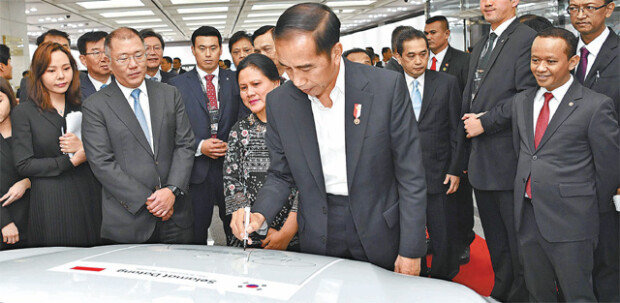Hyundai Motor to build production plant in Indonesia
Hyundai Motor to build production plant in Indonesia
Posted November. 27, 2019 07:24,
Updated November. 27, 2019 07:24

Hyundai Motor Co. has announced that it will invest about 1.8 trillion won to build a manufacturing plant in Indonesia that will be able to produce 250,000 units a year. The automaker’s decision comes as its sales struggled in China and the Southeast Asian markets were dominated by Japanese rivals.
Some say that the Indonesian plant was the last hub of the carmaker’s future global production system driven by Hyundai Motor Group Executive Vice Chairman Chung Eui-sun, who has planned the company’s direction since September last year. If completed, the facility will allow Hyundai to produce 9.57 million vehicles a year in the world along with its sister company Kia Motors.
Hyundai said Tuesday that it signed a preliminary deal with the Indonesian government to build the new factory in a ceremony attended by Indonesian President Joko Widodo and Hyundai’s Executive Vice Chairman Chung Eui-sun held at the automaker’s Ulsan plant. The South Korean carmaker will invest 1.55 billion dollars (about 1.8 trillion won) by 2030 to establish the plant in Deltamas, Bekasi, 40 kilometers east of Jakarta. The construction will kick off next month and continue until the end of 2021. The facility will start by producing 150,000 units a year, and increase its annual output volume to 250,000 units gradually.
ASEAN countries have imposed import tariffs ranging from 5 percent to 80 percent and had various non-tariff barriers, making it difficult for foreign carmakers to make inroads into the local markets. Prior to making the investment decision, Hyundai formed a dedicated team to tap deeper in the ASEAN markets in 2017 and went through thorough research. The company’s decision shows its determination that amid sluggish global sales, it should advance to new markets in the ASEAN region to secure sustainable growth engines for the future.
Hyundai’s Indonesian plant will also enable the company to enter the ASEAN markets, as according to the ASEAN Free Trade Agreement (AFTA), there would be no tariffs on imported vehicles if the carmaker manufactures over 40 percent of auto parts in the region. Hyundai is considering a way to export its vehicles completed in the Indonesian factory not only to the ASEAN region but also to Australia and the Middle East.
Observers say that Hyundai Motor Group has decided to complete its global production system by adding one in Indonesia. “The ASEAN region is constantly growing and expected to account for about 20 percent of the global automobile market in the future,” said Kim Joon-kyu of the Korea Automobile Manufacturers Association. “Hyundai’s decision is in line with its strategy to confront Japanese brands in Southeast Asia, the only region where it used to have no production facilities.”
Do-Hyong Kim dodo@donga.com



![[김순덕의 도발] ‘李부터 연임’ 개헌, 이 대통령은 가능성을 말했다](https://dimg.donga.com/c/138/175/90/1/wps/NEWS/IMAGE/2026/01/16/133172656.1.jpg)



